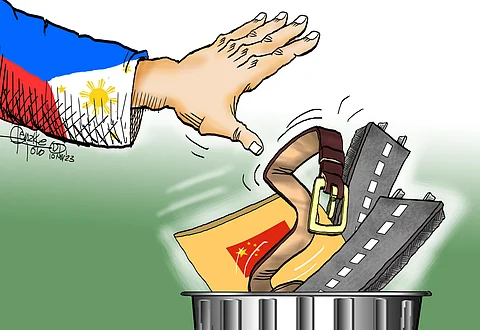
- NEWS
- the EDIT
- COMMENTARY
- BUSINESS
- LIFE
- SHOW
- ACTION
- GLOBAL GOALS
- SNAPS
- DYARYO TIRADA
- MORE

The Philippines' decision to exit from China's Belt and Road initiative may be viewed as a symbolic blow to China, which had counted on the country as a key partner in its expansion into Southeast Asia.
The exit weakens China's position in the region and raises doubts about the viability of the BRI as a tool for expanding Chinese influence.
Launched by China in 2013, the BRI is a massive development project aimed at connecting China to the rest of the world through a network of roads, railways, ports, and other infrastructure.
Over the years, several countries have joined the initiative, believing it to be a pathway to economic growth and development. The recent exit of a first-world country like Italy, ahead of the Philippines, has raised questions about the feasibility and sustainability of the initiative.
The Philippines' decision to withdraw from the initiative marks a significant shift in its foreign policy and economic strategy. While initially embracing the BRI during the term of President Rodrigo Duterte, it has reconsidered its position under the Marcos Jr. administration due to concerns over debt sustainability, sovereignty issues, and growing tensions in the West Philippine Sea.
After a lackadaisical position in the sea dispute, the Philippines has been increasingly assertive in defending its territorial claims in the South China Sea, particularly in response to China's aggressive expansionist policies.
Italy's exit, it must be noted, catalyzed the Philippines' decision as it indicated that even economically advanced countries were not immune to the challenges associated with the initiative. It raised concerns about the financial risks, lack of transparency, and the potential for China to exert influence through economic leverage. The Philippines, like Italy, began to reevaluate its participation and assess the long-term implications of the BRI for its economy and national interests.
The loss of the Philippines as a BRI participant also carries financial consequences for China. The Philippines was expected to be a significant recipient of BRI loans and investments, and the exit means that China will have to allocate its resources elsewhere. This redirection of resources may pose challenges to other BRI projects and potentially delay the completion of infrastructure initiatives in other participating countries.
The pullout sends a message to other countries involved in the BRI that it is possible to reevaluate their participation. As more countries scrutinize the terms and conditions of BRI projects, it may lead to a broader trend of exits or renegotiations, which could undermine China's ambition to create a global network of economic dependencies.
Should this happen, Beijing may have no one to blame but itself. Its aggressive actions in the West Philippine Sea and the failure of diplomatic efforts to resolve the dispute can be seen as a sign that Manila's efforts to tell the world what is really happening in the disputed waterways are paying off.
By enhancing its security cooperation with traditional allies like the United States and exploring partnerships with other regional powers such as Japan and Australia, the Philippines effectively counter China's growing influence in the region while bolstering its maritime security capabilities.
With more countries reconsidering their participation, China's ambition to expand its global influence through the BRI has faced setback after setback and highlighted concerns about the financial and political risks associated with the initiative.
No doubt, the future trajectory of the BRI and the West Philippine Sea dispute will continue to be closely monitored by international observers, as they have far-reaching implications for regional stability and global geopolitics. The Philippines' decision to exit the BRI may inspire other countries to reevaluate their participation, potentially altering China's global ambitions.
